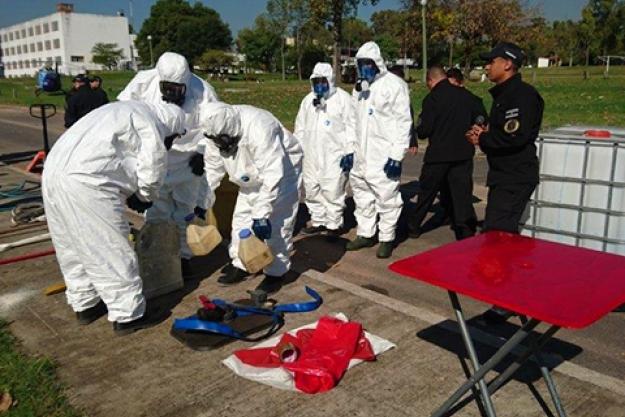
Participants at the Sixth Regional Advanced Assistance and Protection Course on Chemical Emergency Response for States Parties in Latin America and the Caribbean
THE HAGUE, Netherlands — 1 June 2017 — Twenty-one first responders attended the Sixth Regional Advanced Assistance and Protection Course on Chemical Emergency Response for States Parties in Latin America and the Caribbean in Buenos Aires, Argentina, held from 15-19 May.
The course covered the use of individual protective equipment as well as containment, rescue and decontamination procedures, and included a special module on detection, sampling and forensic techniques. Different scenarios of increasing complexity served to enhance participants’ skills in the practice of the incident command system approach for the management of chemical emergencies.
The Executive Secretary of the National Authority to the Chemical Weapons Convention at the Ministry of Foreign Affairs and Worship for Argentina, Minister Mariano Simón-Padrós, reminded attendees in his opening remarks of the threat that non-state actors pose to the implementation of the Chemical Weapons Convention (CWC) and emphasised the need for States Parties to be prepared to respond to chemical incidents.
The course built on the skills and knowledge the participants had gained during the basic course held in Montevideo, Uruguay the previous week and was jointly organised and run by the Argentine National Authority to the CWC, the Ministry of Security for Argentina through the Federal Fire-fighters Superintendence of the Argentine Federal Police, and the Technical Secretariat of the OPCW.
Participants came from 17 States Parties to the CWC: Argentina, Barbados, Brazil, Chile, Colombia, Costa Rica, Cuba, Dominican Republic, Ecuador, Guatemala, México, Nicaragua, Panamá, Paraguay, Peru, Uruguay, and Venezuela.
This training marks six years of successful cooperation between the OPCW and Argentina’s National Authority in the area of chemical emergency response in Latin America and the Caribbean. These activities stem from Article X of the CWC that deals with assistance and protection against chemical weapons.
The next phase of this capacity-building cycle will take place in Brazil in August 2017 and comprise a set of practical exercises.
Background
As the implementing body for the Chemical Weapons Convention, the OPCW oversees the global endeavour to permanently and verifiably eliminate chemical weapons. Since the Convention’s entry into force in 1997 – and with its 192 States Parties – it is the most successful disarmament treaty eliminating an entire class of weapons of mass destruction.
To date, nearly 95 per cent of all chemical weapon stockpiles declared by possessor States have been destroyed under OPCW verification. For its extensive efforts in eliminating chemical weapons, the OPCW received the 2013 Nobel Prize for Peace.
